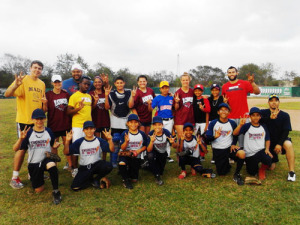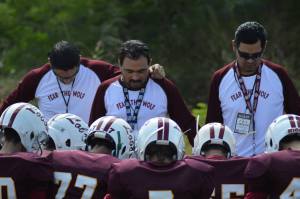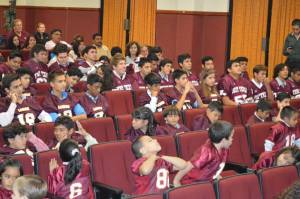When Diego Sosa was 11-years-old, he started having severe pain in his right shoulder. Turns out, the aspiring baseball pitcher had juvenile rheumatoid arthritis, a not terribly uncommon ailment in kids under the age of 17 that causes persistent joint pain and inflammation.
Sosa had been playing baseball in his hometown of Merida, Mexico, since he was five-years-old. He caught the bug from his father who, although in his early 60s, is still playing organized ball today. So the diagnosis was a devastating setback not just physically, but emotionally as well.
“I became angry with God,” he explains.
For the next four years, he went through many doctors and numerous therapies and treatments. Nothing seemed to work. Sosa had to quit playing the game that he loved. Around the same time, his mother began going to an Evangelical church. Sosa went with her to make her happy, but his previous issues with God kept him from fully embracing the experience.
 At the age of 18, Sosa went with his mother to church for what was supposed to be the last time. He was going to tell her he wasn’t going to go anymore. But that day, his Bible study leader happened to be a friend of his from college. That young man presented the gospel to Sosa in a way that resonated like never before. Instead of quitting church, he gave his heart to Christ and hasn’t turned back since.
At the age of 18, Sosa went with his mother to church for what was supposed to be the last time. He was going to tell her he wasn’t going to go anymore. But that day, his Bible study leader happened to be a friend of his from college. That young man presented the gospel to Sosa in a way that resonated like never before. Instead of quitting church, he gave his heart to Christ and hasn’t turned back since.
Although Sosa was no longer able to pursue athletics, he desperately wanted to stay involved in sports somehow. That same friend who led him to the Lord also worked for Campus Crusade For Christ and invited him to an Athletes In Action (AIA) student conference.
“That’s the first time I heard of a thing called sports ministry,” Sosa recalls. “I was amazed to find out that people could share the gospel through sports.”
After helping organize a baseball tournament in Merida with AIA, the concept took root and Sosa was able to see the power of sports ministry first hand. He spent close to six years on full-time staff with AIA before transitioning to his current work with Fellowship of Christian Athletes in August of 2013. It was a rebirth in more than one way. He and his wife Rose welcomed their third child, a daughter named Lila Grace, the same month.
In fact, Sosa and his wife have been working together in sports ministry since they married in 2005. She is from Central Florida and the two met when she was studying Spanish in Merida, a coastal town located across the Gulf of Mexico, directly south of New Orleans. The original plan was to settle down in the United States, but God had other ideas.
 Sosa describes himself as “a weird Mexican.” He isn’t that big of a soccer fan and, even more surprisingly, lists American football as his second favorite sport behind baseball. Sosa currently represents Baseball Chapel as the chaplain of a professional team in Merida. He also works with a football club that he co-founded called The Lobos. This allows him the opportunity to mentor over 100 players on four different teams that range from five-years-old to high school age.
Sosa describes himself as “a weird Mexican.” He isn’t that big of a soccer fan and, even more surprisingly, lists American football as his second favorite sport behind baseball. Sosa currently represents Baseball Chapel as the chaplain of a professional team in Merida. He also works with a football club that he co-founded called The Lobos. This allows him the opportunity to mentor over 100 players on four different teams that range from five-years-old to high school age.
“We have been so blessed by God,” Sosa says. “Every day we work with a different team. We have a Bible study with the players, but my goal is to have a one-on-one discipleship opportunity with each athlete throughout the season.”
The FCA staff in Houston donated football equipment to his club, and a group of students from the University of Houston assisted him this summer with camps and other ministry outreaches. Sosa has also established a vital relationship with his local church and other area pastors that are getting involved with his camps and conferences.
One of Sosa’s primary goals is to show Christ’s love to the athletes and their parents through the way that he and his coaches approach their work on the field. And even though many of his coaches are not yet believers themselves, Sosa knows that they are also getting the message.
“If I were to measure how many people have come to Christ in the last 12 years of doing sports ministry, I would probably think that I was a failure,” he says. “But even though many of them haven’t professed a relationship with Christ, I have seen how these coaches have changed in the way they treat their wives and their kids and how they treat the players. The parents don’t understand what’s happening, but they can see the difference, and they like it. God has been blessing this program.”
 While football has became a new passion, baseball is still Sosa’s first sports love, keeping him quite busy in 2014. Back in February, he spoke to a group of kids at a baseball clinic that one of the local professional athletes organized. In April, he traveled with Baseball Chapel to Oaxaca, Puebla and Mexico City to help interview and recruit new chaplains for those cities’ teams.
While football has became a new passion, baseball is still Sosa’s first sports love, keeping him quite busy in 2014. Back in February, he spoke to a group of kids at a baseball clinic that one of the local professional athletes organized. In April, he traveled with Baseball Chapel to Oaxaca, Puebla and Mexico City to help interview and recruit new chaplains for those cities’ teams.
According to Jim Roquemore, FCA Director of Ministry Advancement for Latin America and the Caribbean, Sosa’s enthusiasm for sports ministry and his willingness to go the extra mile is what will help make the burgeoning work in Mexico a success.
“Diego has great desire to serve the people of sport at all ages,” Roquemore says. “While he is new to FCA, he brings a unique passion to his approach to life and ministry.”
For now, the future is mostly consumed with building up the work in Merida. But that doesn’t mean expansion into other parts of the country isn’t a possibility. He has been communicating with some Liberty University students about starting a chapter in Mexico City once they complete their education and return home.
Otherwise, Sosa and his wife plan to continue focus on the task at hand and take whatever opportunities come their way.
“God has been very faithful in every aspect of this work,” he says. “God has His purpose for this ministry. As long as He has that purpose, I will keep doing what I’m doing.”
Five Facts About Mexico
- Complex cultures first formed in Mexico around 1800 B.C., and gave rise to iconic civilizations such as the Mayans and the Aztecs that were credited with many inventions and advancements in the fields of architecture, mathematics, writing, astronomy and medicine.
- Mexico has the largest Spanish-speaking population in the world with almost a third of all Spanish speakers. Roughly 65 percent of the 112 million citizens are referred to as “Mestizo,” or the blending of people from indigenous cultures and European traditions.
- Roman Catholicism is Mexico’s main religion and makes up 83 percent of the population. Other Christian denominations (including Evangelicals and Pentecostals) make up another 10 percent of the population, while five percent claim no religion at all.
- Mexico is known for its many native culinary ingredients including chocolate, avocado, tomato, zucchini, vanilla, guava and a wide variety of chile peppers including the jalapeno and the habanero.
- In 1968, Mexico City became the first Latin American city to host the Olympics. Soccer is considered to be the nation’s most popular sport, but baseball is also widely followed. Some notable Mexican athletes include Fernando Valenzuela (baseball), Edjuardo Najera (basketball), Julio Cesar Chavez (boxing), Fernando Platas (diving), Lorena Ochoa (golf), Hugo Sanchez (soccer) and Jorge Campos (soccer).
Stay Connected With FCA Mexico
Website: www.fca.org/international/mexico
Email: DSosaMadera@fca.org